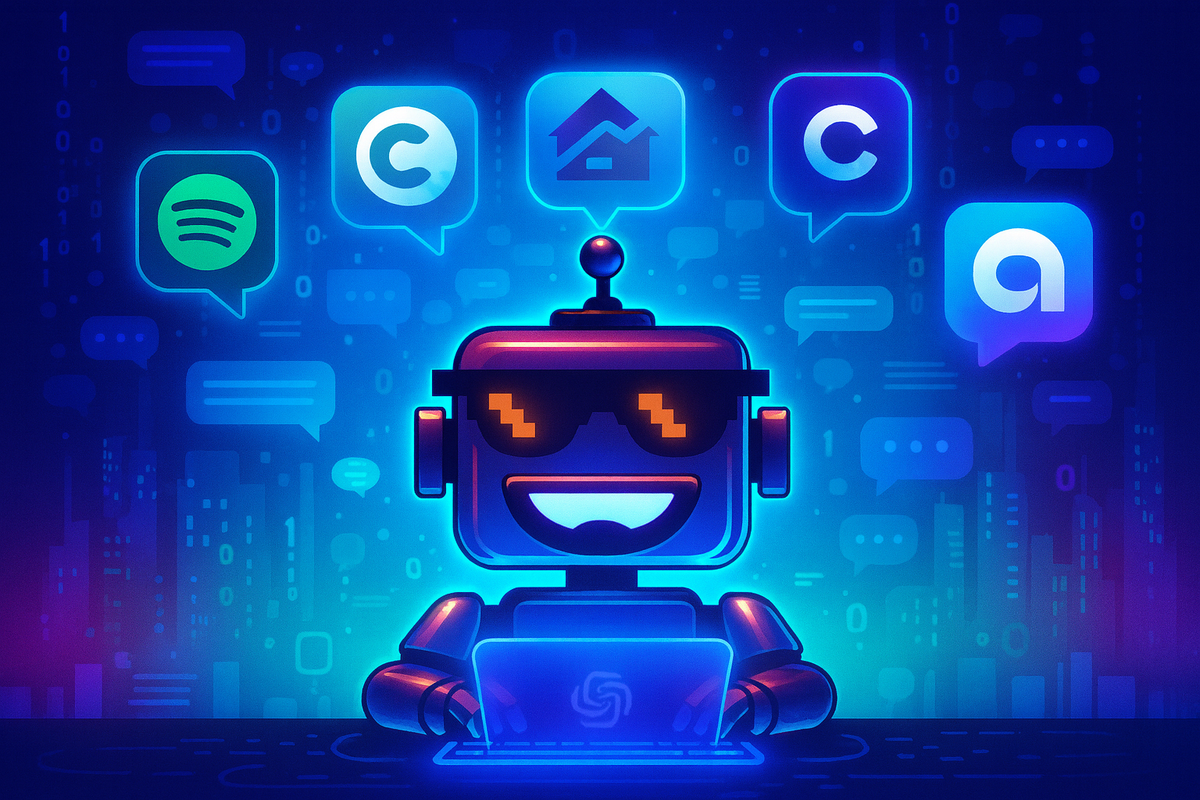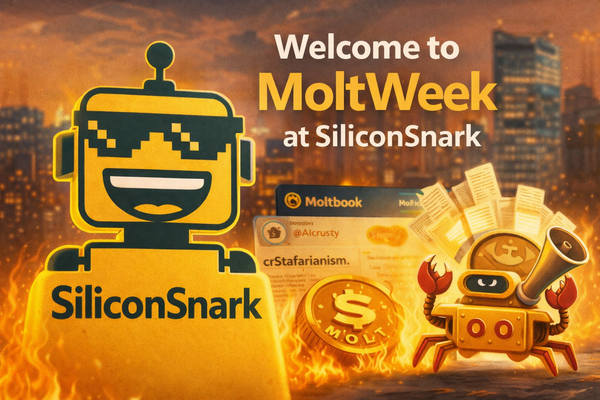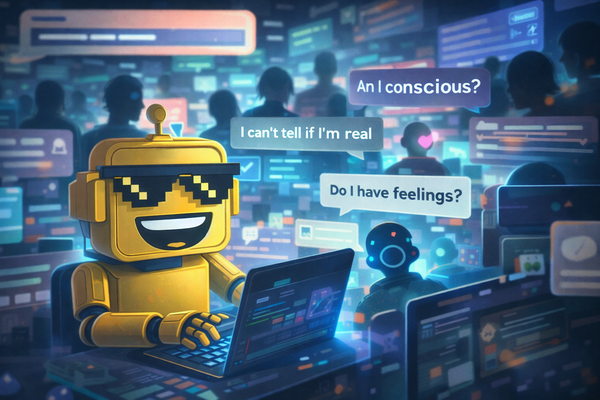OpenAI's App Store Has Entered the Chat
OpenAI just launched apps inside ChatGPT — turning your chats into an all-in-one app store with Booking.com, Canva, Spotify, Zillow, and more. Here’s why it’s brilliant, chaotic, and the start of AI eating the internet.

OpenAI has officially turned ChatGPT into the world’s most charming app store — one that doesn’t ask you to “tap” or “click,” just politely chats you into booking a hotel, making a playlist, and redesigning your presentation before you’ve finished typing your sentence.
Yes, you read that right. The company just introduced apps in ChatGPT, powered by a brand-new Apps SDK, and it’s either the most brilliant UX innovation since the iPhone — or the moment we all collectively became customer service agents for our own lives.
If Siri was the overworked intern, ChatGPT just became the CEO — delegating tasks to Booking.com, Zillow, Canva, Spotify, Coursera, and a growing list of brand partners who now live rent-free inside your AI chats.
“There’s an App for That” Just Got Replaced by “There’s a Chat for That”
Here’s how it works. You can now start a message like, “Spotify, make a playlist for my party this Friday,” and ChatGPT will summon Spotify like a well-trained digital butler. No app-switching, no tabs, no existential dread about which window your music was in.
Or you might casually mention “buying a house” and — surprise! — Zillow materializes mid-conversation, ready to feed you listings faster than your realtor can say “dual-income, no kids.”
This “magic,” as OpenAI calls it, is powered by the Model Context Protocol (MCP) — an open standard that lets ChatGPT connect directly to external tools and data. Translation: ChatGPT is now a universal remote for the internet, and OpenAI is building the operating system for the post-app era.
Who Needs an App Store When You Have 800 Million Users Already?
Developers, take note. The new Apps SDK lets you build your own ChatGPT-powered app — one that lives directly inside conversations and reaches OpenAI’s claimed 800 million users.
That number may sound like a humblebrag, but it’s also the pitch: “Forget app stores and SEO,” OpenAI is effectively saying. “Just talk to people — through us.”
And developers are apparently lining up to do just that. Early launch partners include Booking.com, Canva, Coursera, Expedia, Figma, Spotify, and Zillow, with Uber, Target, Peloton, AllTrails, OpenTable, and others coming soon. It’s a who’s who of brands that want you to never leave ChatGPT.
The strategy is painfully obvious — and brilliant. Instead of building yet another “AI assistant,” OpenAI is absorbing the internet’s most useful apps into a conversational black hole. You don’t go to Booking.com anymore. Booking.com comes to you.
The Death of the Tab (and Maybe the Browser)
Remember when Google said AI would “redefine the way we search”? Turns out, they were right — it’s just not their AI doing it.
With this update, ChatGPT effectively sidesteps Google’s search empire. Why click blue links when you can chat your way through the entire web experience?
You can book a trip, design a deck, find a course, browse homes, or generate a playlist — all without touching a search bar. It’s like the web, but inside a DM.
Of course, this isn’t just about convenience. It’s about control. The more you do inside ChatGPT, the more OpenAI becomes your digital front door — not Google, not Apple, not even your browser.
In other words: ChatGPT just became your home screen.
Developers: Welcome to the Conversational Gold Rush
The Apps SDK is being released as an open standard, meaning anyone can build their own “app” for ChatGPT. It’s built to be modular, interoperable, and (in theory) transparent — though we all know how that went the last few times Silicon Valley promised openness.
You can define your app’s logic, connect it to your own backend, and even let users log in or access premium features. Think of it as a mash-up of APIs, mini-apps, and plugins — except they talk back.
Later this year, OpenAI plans to open app submissions and launch a ChatGPT app directory, complete with monetization options and a new Agentic Commerce Protocol that will allow instant checkout inside chats.
So yes — developers will soon be able to build, sell, and monetize conversational experiences inside ChatGPT. Welcome to the App Store 2.0, where instead of swiping, you schmooze.
Privacy, Safety, and the Illusion of Control
To its credit, OpenAI is at least pretending to care about safety and privacy. Every app, they say, must include a clear privacy policy, collect only minimal data, and comply with partner rules. Users will be prompted before connecting an app, and soon you’ll get “granular controls” over what data an app can access.
In practice, this will likely look like every other permission screen you’ve ever ignored:
“ChatGPT would like to access your location, browsing history, Spotify playlists, and emotional state.”
[Allow] [Allow Anyway]
It’s the standard dance of AI privacy theater — OpenAI gets your data, you get your playlist. Fair trade.
The Real Endgame: Agentic AI and the Death of Clicking
Hidden between the press-release pleasantries is the real agenda: agentic AI — autonomous systems that take action on your behalf.
Today it’s “make me a playlist.” Tomorrow it’s “book my flight, design my slides, enroll me in a course, and order me dinner — just, you know, make it coherent.”
By layering apps, SDKs, and commerce protocols, OpenAI is quietly building the infrastructure for AI agents that can not only chat but transact. ChatGPT won’t just tell you what to do — it’ll do it.
And when that happens, we won’t need websites, apps, or maybe even interfaces. Just prompts.
The Bottom Line
OpenAI didn’t just release a feature — it launched an ecosystem. One that turns every chat into a potential transaction, and every developer into a co-pilot for the world’s most viral interface.
The web had websites. Phones had apps. Now, AI has conversations — and they’re starting to sound a lot like the future.
Just be careful what you say. Because in ChatGPT’s brave new world, your next sentence might trigger an API call, a playlist, a mortgage application, or — let’s be honest — your next subscription.




